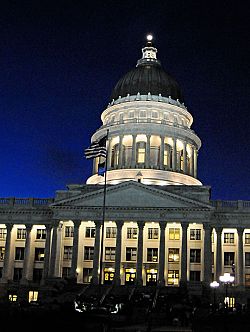Mixed results for Catholic Social Justice priorities during 2018 Utah legislative session
By Jean Hill
Intermountain Catholic
Per the Utah Constitution, the state Legislature must end its session at midnight on the 45th day even if not all proposed bills have passed through the entire legislative process. True to form, when the final gavel sounded at midnight on March 8, legislators left several bills on the board without a final vote.
Among these was a bill to strengthen Utah’s Stand Your Ground law, also known as the shoot-first-and-ask -questions-later bill. This was one of several bills that the Diocese of Salt Lake City was tracking, in keeping with Catholic Social Justice advocacy. Other priorities of the diocese fared as follows:
Sanctity of Life
Legislators heard two abortion-related bills this session, passing one through the process. Senate Bill 118 Abortion Law Amendments updates and improves the state’s informed consent law. The new law requires the Department of Health to eliminate an outdated video and replace it with online modules that are more accessible and easier to adapt. The modules also help eliminate the bias some women felt when talking to their doctors about the old informed-consent pamphlets and video.
HB 205 Down Syndrome Nondiscrimination Abortion Act was more controversial and one of only two bills to include a note from legislative attorneys about the likelihood that it could be found unconstitutional. The bill passed the House and a Senate committee but was not prioritized for a final vote in the Senate. The bill would have made it a crime for a doctor to perform an abortion if he or she knew the women seeking the abortion wanted to do so because the baby had been diagnosed with Down syndrome.
On the other end of the sanctity of life spectrum, a House committee passed HB 379 Death Penalty Amendments, which would have ended the practice of state executions, but the bill sponsor pulled it from the House floor before it could be voted on by the full body. The idea that government should not be trusted with life-and-death decisions gained some traction in the Legislature and will be back in a future session.
Legislators passed HB 86 Manslaughter Amendments, clearly stating that assisting a suicide is a crime. The bill’s sponsor sought to address the situation, which occurred last year, of a young man who provided the means for a young woman to commit suicide in Utah, but the bill also makes it clear that doctor-assisted suicide is similarly illegal. The bill does protect doctors who, in accordance with Catholic teaching, may use procedures for treatment and pain relief that hasten death without intending to assist the patient’s suicide.
Preferential Option for the Poor
Legislators passed some legislation to assist people in poverty, though other important bills failed.
On the plus side, legislators passed a bill waiving the fees for obtaining a birth certificate for people experiencing homelessness. For many who live on the streets, one major barrier to gaining employment and housing is a lack of identification. Waiving the $20 fee for the birth certificate will open a door for those in homelessness.
Legislators also passed HB 170 Licensing Fee Waivers Amendments, which waives fees for professional licensing for individuals who are receiving public assistance, again reducing barriers to work.
However, individuals in poverty will still struggle to find affordable housing after a $100 million bond bill failed to pass the Legislature. Nevertheless, some bills that would have eliminated incentives to build affordable housing also failed and legislators did vote to study the problem. With the main homeless shelter in Salt Lake City set to close in 2019, the already low stock of affordable housing across Utah is a critical issue that must be addressed sooner rather than later.
Legislators also refused to eliminate the sales tax on food, proposed in HB 148 Tax Revisions, and provide an Earned Income Tax Credit for families living in intergenerational poverty, as proposed in HB 57 Utah Intergenerational Poverty Work and Self Sufficiency Tax Credit. Both bills passed the House but failed in the Senate.
The work of the 2018 Utah Legislative session will continue on several fronts during the interim sessions held monthly from April through November.
© Copyright 2024 The Diocese of Salt Lake City. All rights reserved.


Stay Connected With Us